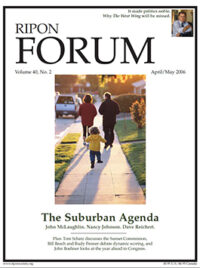Ten years ago this past January, Bill Clinton delivered his State of the Union Address in which he famously declared that “The era of big government is over.” In this same speech, he also reiterated his support for school uniforms and the V-chip.
His endorsement of these two initiatives won him praise and criticism from both sides of the aisle. It also helped set the stage for a run of political successes over the next 10 months that culminated not only in his victory over Bob Dole in November, but in Democrats picking up seats in Congress, as well.
During this period, President Clinton pushed forward with a series of proposals intended to help show that he was in touch with the American people and was working on their concerns. He talked about tuition tax credits for college students, proposed that workers be able to take time off instead of extra pay for overtime, and went after deadbeat dads by garnishing their federal benefits and plastering their mugshots in post offices across the country.
In his book, Behind the Oval Office, former Clinton advisor Dick Morris described these initiatives as being part of a positive values agenda that sought to put Republicans on the defensive.
“Trivialized in the press as ‘small bore,’” Morris wrote, “it [the values agenda] nevertheless showed voters what an activist President could do for the average person with the help of Congress and often without it.”

Clinton’s support for these “small bore” initiatives also showed voters something else – mainly, how a President or political party could express their support for limited government and pursue an activist government agenda, too. It was a balancing act Republicans, at the time at least, never quite understood. Indeed, in the years after they took control of Congress in 1994, GOP rhetoric and talking points focused almost exclusively on the need to cut the size of government. While this appealed to the party’s base, it failed to recognize that most Americans do not just want smaller government. They want smarter government, as well.
Bill Clinton recognized this. So, too, did George W. Bush, who, when he ran for President as a compassionate conservative in 1999, stated that, “Government should do a few things, and do them well.” Some might argue that some of the President’s problems these days stem from the fact that he seems to have forgotten these words. Under his administration, government has gotten larger, not smaller. And, given the response to Hurricane Katrina, it’s safe to say that most Americans do not perceive the federal government as being very smart.
The challenge for Republicans this November is to change these perceptions. And to do this, they need to put forward positive ideas designed to reaffirm to voters that Republicans are committed to making limited government more effective. The Suburban Agenda is one such idea. It is a comprehensive effort by House Republicans to make government work without making government bigger. The proposal to establish a Sunset Commission is another idea. It is an attempt to set limits and promote accountability within the Washington bureaucracy – two things that are essential if smaller, smarter government is to succeed.
The key thing for Republicans is to present a positive plan. In his book, Dick Morris referred to this as a “message of relevance.” Maybe that’s the key lesson to take away from the values agenda President Clinton promoted in 1996. It wasn’t about school uniforms. It wasn’t about the V-chip. It wasn’t about any of the initiatives he pushed in his drive for reelection that year. Rather, it was about being relevant – which, when you think about it, is not just smart government, but smart politics, as well.
Louis M. Zickar is the Editor of the Ripon Forum




